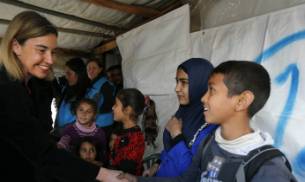
Education is one of the main basic human rights and every individual is entitled to be educated.
What is education?
- “Education transforms lives and is at the heart of UNESCO’s mission to build peace, eradicate poverty and drive sustainable development, ” says the website
- They also mention that education is a human right for all throughout life and that access must be matched by quality
- However, the scenario is completely different for the refugee children, who cannot exercise this fundamental right, as food, water and shelter are their immediate needs (Read:Schooling for all refugee children, urges Malala Yousafzai)
Importance of education:
- In Associate Press report, the UN High Commissioner for Refugees, Filippo Grandi, says “while education is vital for all children, it’s especially crucial to help equip refugee children to succeed in work and life”
- “Education is also a key contribution to keeping the hope of refugees, and in situations in which despair is so prevalent, going to school, learning, acquiring knowledge and skills, are fundamental,” Grandi told in an interview on Tuesday

What is UN planning for these children?
- Since education develops the mindset of children from a very tender age, so it is quite evident that no education can lead to more uncivilised, un-peaceful condition in a war state
- This is why United Nations’ refugee agency is impelling the world to ensure basic education to the refugee children
- The subject was discussed at the UN General Assembly, where a 48-page report was released
- A summit on refugees and migrants will take place in New York next week
Shocking figures:
- It is estimated that the refugees spend as much as 20 years in exile
“The average length of time a refugee spends in exile is about 20 years,” Grandi wrote in the report’s introduction. “Given this sobering picture, it is critical that we think beyond a refugee’s basic survival,” he added
- The repercussion of this period is adversely affecting the children in exile
- According to the United Nations High Commissioner for Refugees, over 3.7 million school-age children do not have an access to school
- While 90 per cent children across the world can avail primary education, only half of the refugee children can get the same
- Likewise, one in every four refugee can attend senior secondary school, however 84 per cent children read in high school globally
- Universities are attended by only one per cent of refugees
What could be the solution?
The United Nations have come to a number of solutions towards helping these children get proper education:
- More charitable organisations should come forward to help these children
- As they are supposed to get education in their current territory, respective governments must bring in action plans
- More than 86 per cent refugees are hosted in developing counties
- Countries without schools for refugees:
- Chad
- Congo
- Ethiopia
- Kenya
- Lebanon
- Pakistan
- Turkey
- source”cnbc”




